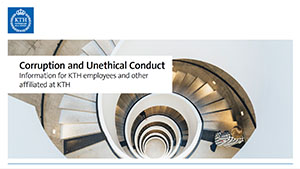Introduction to the brochure about Corruption and Unethical Conduct
KTH must strive for openness and transparency, both internally and externally. At the same time, KTH must combat the emergence of a culture of fear and reporting. It is therefore important that employees and other affiliated at KTH keep themselves informed of what applies in their professional role. We all have a responsibility to react and report if we become aware of corruption and misconduct or other irregularities. In addition, managers are responsible for preventing and stopping unauthorised or inappropriate actions.
Definitions
What do the concepts of corruption and unethical conduct mean? Corruption includes phenomena such as abuse of power, bribery, nepotism, and cronyism. Crimes such as theft, fraud, embezzlement, or breach of trust can also, in a broad sense, be included. Deliberately failing to comply with regulations can also be considered unethical conduct.
The Government’s definition of the concept of corruption in public administration is: Corruption means to use a public position to obtain an undue advantage for one’s own or someone else’s gain.
Unethical conduct has a broader meaning and includes conduct that is contrary to the KTH Ethical Policy. Unethical conduct can involve acting in a way that harms the trust in KTH as a higher education institution.
Together, we must enhance and cultivate our ability to make ethical considerations in our work. Providing guidance is the central government core values, which are described in the next section.
Our activities
The mission of KTH is to conduct education and research activities as well as to collaborate with our surrounding community. Our work against corruption and unethical conduct must be related to the issues and dilemmas that face us in our own activities. The aspects addressed here concern us as researchers, teachers, examiners, managers, administrators, etc.
Under the Higher Education Act and the Higher Education Ordinance, we, as a higher educational institution, also have a special responsibility when it comes to research ethics issues. We must uphold academic credibility and good research practice. In the event of suspected research misconduct, KTH is obliged to investigate the circumstances. When it comes to teaching, students must be given conditions to achieve national qualitative targets that relate to judgement, approach, and ethical aspects.
Counteracting risks and working for a healthy internal environment
KTH must ensure that activities are legally certain and that the internal environment contributes to our ability and willingness to work for common goals and follow the rules. To do so, we need good organisation and distribution of responsibilities and powers. In this way, we can prevent corruption, undue influence, fraud, and other misconduct. To detect misconduct, it is also important to monitor and inspect the use of KTH funds and resources.
In risk analysis, you identify the risks that may result in the organisation not fulfilling its duties or achieving its business goals. The KTH overall risk analysis includes risks that relate to the internal environment (work environment), compliance and misconduct, as well as security, which may be linked to corruption and unethical conduct.
There are areas of activity with a higher level of risk, where KTH must take preventive action. These include research activities that are extensive and complex, that have large resources at their disposal, and that have relationships with various partners and sources of funding. Information security and management of sensitive and strategic information is another area that may be difficult to assess.
Purchasing and procurement are generally considered a risk, since bribery, pressure, or cronyism may result in a supplier being favoured. Yet another example is travel and representation, where a third party may want to pay for a trip or an event with the intention of influencing a KTH employee.

